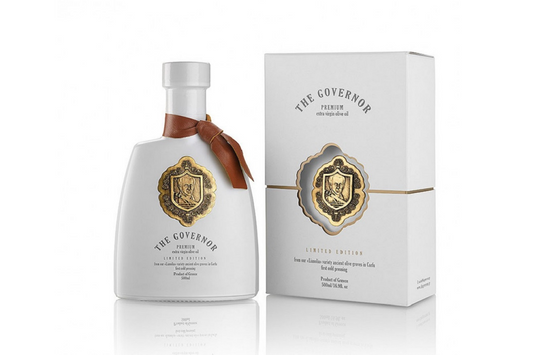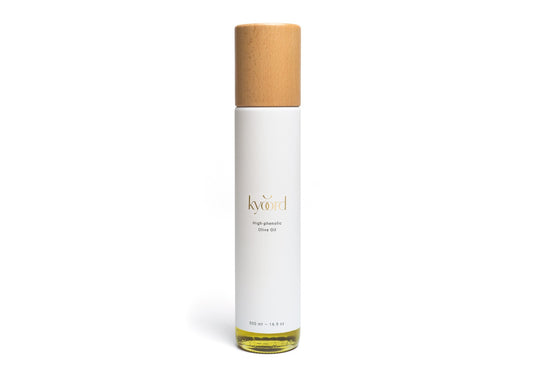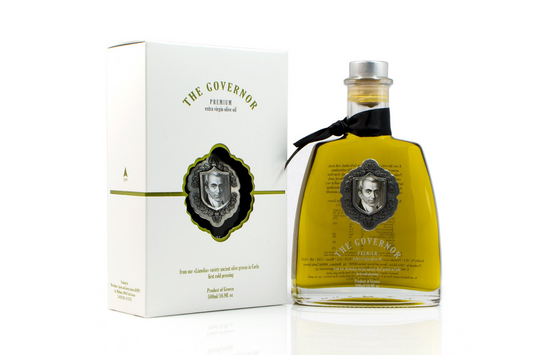Medicinal Olive Oil – What is it? The Role of Polyphenols
It all comes down to polyphenols – the antioxidants naturally found in olive oil that have been found to have preventative and therapeutic effects for cardiovascular disease, cancer, and other chronic illnesses.
Olive oil storage and freshness
But the question comes down to the amount and concentration of polyphenols that the olive oil contains, and the freshness of the olive oil. Why? Because olive oils vary greatly in their polyphenol content, and those polyphenols can degrade overtime, especially if not stored properly.
Scientists suggest classifying medicinal olive oils, or high-phenolic olive oils, as medicinal grade depending on the amount of polyphenols they have. However, in the United States, the FDA doesn’t require brands to list polyphenols on olive oils, which can make it difficult to determine if an olive oil is truly a high-quality medicinal olive oil.

Medicinal Grade Olive Oil Standards
The European Food Safety Authority has determined that only olive oils with more than 250 mg/kg of polyphenols can bear a health claim of being medical-grade. However, scientists disagree, and suggest that this threshold is too low. Because of the known degradation during storage, experts suggest that only olive oils with over 500 mg/kg polyphenols should be called high-phenolic, and thus considered medicinal-grade. Here at kyoord, our oils easily surpass this minimum since we only make truly high-phenolic olive oils.
Oleocanthal: The Most Powerful Medicinal Polyphenol
While there are many different types of antioxidant polyphenols, there are some that are more powerful than others and have specific medicinal properties linked to them. One of the most studied olive oil polyphenols is oleocanthal - which is a strong anti-inflammatory molecule. We recommend specifically looking out for oleocanthal concentration when considering olive oil for medicinal purposes. Oleocanthal has been associated with the alleviation of many conditions that are caused by inflammation, including neurological disorders, gut issues, and cancer.
The difference between Medicinal Grade Olive Oil and regular EVOO
Typically, your average extra virgin olive oil found in supermarkets contains around 150mg of polyphenols per kg. While this still makes olive oil a great cooking oil for your health, you’ll need to consume 5-7x more to get the same benefits as high-quality medicinal olive oil. Regular EVOO may require you to consume upwards of half a cup to reap the same benefits of just a tablespoon of medical-grade olive oil.
Keep in mind that many supermarket brands have been found to be fraudulently labeled or mixed with low-quality oils – and those will have absolutely no benefit to your health. Need help spotting counterfeit olive oils? We’ve got you covered with tips here.

6 Medicinal Ways High-phenolic Olive Oil can be Used
Studies have shown that medicinal olive oil offers a variety of health benefits. Scientists have found that the antioxidants (polyphenols) and anti-inflammatory molecules (oleocanthal and oleacein) in medicinal olive oil may:
- Improve brain health – Replacing lower quality oils, like safflower or canola, with high-quality olive oil was shown to improve cognitive function in just one year.
- Combat diabetes – Researchers found that the polyphenols in olive oil may help to maintain and combat diabetes.
- Improve inflammation – A recent human study demonstrated that consuming olive oil high in phenols and triterpenes may reduce inflammation and DNA oxidation.
- Fend off cancer – Studies have shown that the polyphenols in EVOO have the ability to kill or reduce the survival of cancer cells, but not non-cancerous cells.
- Boost heart health – High-phenolic olive oil has been shown to improve blood pressure, endothelial function, and cholesterol levels.
-
Reduce risk of all-cause mortality – A 28-year study with 90,000 participants found that replacing 10g of butter, mayonnaise, dairy fat, or margarine with high-quality olive oil may reduce the risk of all-cause mortality by almost 20%.
These health benefits can be maximized by using medicinal olive oil as:
- A daily shot – take a shot of pure medicinal olive oil every morning.
- A cooking oil – the high smoke point makes it a great option for everyday cooking.
- A drizzle – the robust, pepper-y taste makes it a perfect option for drizzling over your favorite meals, salads, and even desserts!

How much medicinal olive oil do you need to reap the benefits?
We recommend consuming one tablespoon a day of medicinal olive oil for a healthier lifestyle and disease prevention, or at least two tablespoons daily to improve pre-existing conditions.
You’ll need 5-7x more per day with regular EVOO that isn’t considered medical-grade.
Who should be choosing medicinal olive oil?
Since high-quality medicinal olive oils can get quite pricey, we only recommend switching to high-phenolic, or medicinal olive oil, if fall under one of the below three categories:
-
Olive Oil, Cancer Prevention and Diseases
If you are suffering from, recovering from, or at risk for a serious health condition, for which high phenolic olive oil can provide benefit. Some of those conditions include: cancer, Alzheimer’s or other neurodegenerative disease, hypertension or other heart / cardiovascular conditions, diabetes (especially type 2), and any inflammatory disease.
-
Olive Oil for Health
You are in good physical health, but want to invest in a healthy lifestyle and a proven nutritional approach to lower your risk of health issues later in life.
-
Olive Oil and Autism
Some parents of kids who are on the Autism spectrum report that high phenolic olive oil is beneficial in treating some associated symptoms especially in the behavioral and verbal domains. To date, there is not enough scientific data to confirm this claim, and it is not clear whether any olive oil can support ASD symptoms or whether high phenolic oils provide extra benefit.
Have questions about medicinal olive oil? Reach out to us at info@kyoord.com!










